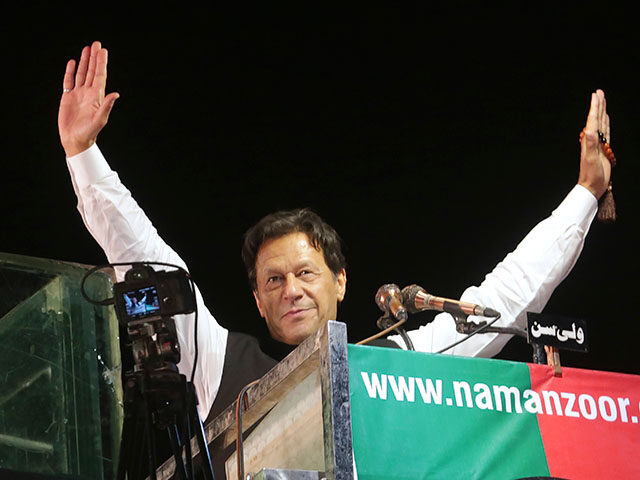The government of Pakistani Prime Minister Shehbaz Sharif appears to have found a temporary solution, at least, to the problem of his predecessor and rival Imran Khan: a directive requiring the media to screen out “hatemongers, rioters, their facilitators and perpetrators” has effectively blacked out news coverage of Khan and his political comeback campaign.
Reuters reported Monday on the directive from the Pakistan Electronic Media Regulatory Authority (PEMRA), which was issued last week. The order to media outlets did not single Khan out by name, but demanded a complete blackout on rioters – and the big riot story in Pakistan at the moment is Khan supporters vandalizing government and military property in a burst of outrage after he was arrested on May 9.
Khan was released a few days later on bail ordered by the Islamabad High Court and he is at present free to continue his campaign for a return to the prime minister’s office. He was ousted by a parliamentary vote of no confidence in April 2022 and has been running a populist and Islamist campaign to return to power ever since.
Khan has become the most popular political candidate in Pakistan according to the last round of polls, in part because the Sharif government is blamed for mismanaging the economy. Khan enjoyed 62 percent approval in a March poll by Gallup, the most recent major poll from a reliable firm, while Sharif scored only 32 percent.
Reuters noted that media coverage of Khan has nevertheless “disappeared” because of the PEMRA edict, with no sign of his name or face on television or news websites. Khan was a celebrity athlete with a lively personal life before he became prime minister, and his political comeback was one of the biggest stories in the country, so he drew a great deal of media attention before the blackout went into effect.
“Even ARY News, considered a pro-Khan channel by the former prime minister’s political opponents, had no mention of Khan on Monday, despite his standoff with the military dominating headlines globally for weeks,” Reuters observed.
Amnesty International denounced the media blackout in a statement to Reuters as “the latest in a series of disturbing steps that authorities have taken to crack down on the opposition.”
“Trying to keep Imran Khan off the media is censorship and curtailment of media freedom by the imposed regime in Pakistan,” Khan’s PTI party declared on Thursday.
The Intercept claimed on Saturday that the PEMRA ban on coverage of “rioters” was not the only reason Khan has vanished from Pakistani headlines.
According to The Intercept, the powerful Pakistani military sent an invitation that “could not be refused” to the owners of major media organizations, then explicitly told them to discontinue all coverage of Khan.
The military has been feuding with the former prime minister because he accused them of incompetence and various improprieties, including complicity in a plot to assassinate him. Khan even accused the military of staging the May 9 riots, using stooges to damage its own property, so it could blame the unrest and vandalism on him. Late last month, the military publicly warned its former ally Khan to stop “slandering” it.
The Intercept said six Pakistani journalists confirmed the military ordered them to stop covering Khan. The BBC quoted “two sources at different TV stations” last week who said they “told not to mention or show Imran Khan, not even on their ticker tape.”
Foreign Policy (FP) observed on Monday that Pakistani media organizations might like the traffic and clicks Khan brought in, but they do not have warm memories of how they were treated when he was in power and wielding the media ban hammer:
There are concerns about clumsy censorship – Dawn newspaper called the ban “a thinly disguised warning to the media to stay in line” – but Khan is widely reviled for his abuse of freedoms during a foreshortened premiership, which ended when Parliament voted him out of office in April 2022. He used similar bans against his own political enemies, and journalists were brutally targeted for critical reporting. Still living with the culture of fear and self-censorship that Khan exacerbated, most Pakistani journalists are unwilling to speak openly against the government or the all-powerful Army that backs it.
Human Rights Watch (HRW) called out Khan’s government in its 2021 report, noting that efforts to control media and contain dissent included violent attacks on journalists such as Absar Alam, who was shot outside his house; Asad Ali Toor, who was bound, gagged, and beaten in his home; and talk show host Hamid Mir, who was taken off the air. All were sharp critics of Khan’s government.
Khan himself imposed a very similar media ban in 2020 on his own predecessor, Nawaz Sharif, brother of current PM Shehbaz Sharif. He would be unlikely to champion press freedom if he regains the prime minister’s office, which he will theoretically have a chance to do sometime this fall, unless he succeeds in forcing the election to be held early – or continued unrest prompts the Sharif administration and/or the military to suspend the election entirely.

COMMENTS
Please let us know if you're having issues with commenting.